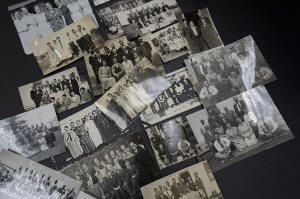Survivors seek a reckoning as FBI investigates child sex abuse in
little-known Christian sect
 Send a link to a friend
Send a link to a friend
 [December 16, 2024]
By REBECCA BOONE [December 16, 2024]
By REBECCA BOONE
BOISE, Idaho (AP) — Nearly every detail about the religious group Lisa
Webb’s family belonged to was hidden from the outside world. Its
followers met in homes rather than churches. Its leadership structure
was hard to discern, its finances opaque. It didn’t even have an
official name.
But for decades, no secret was as closely guarded as the identities of
the sexual predators inside the group known as the “Two by Twos.”
Now a growing number of public allegations from around the world have
prompted a broad investigation by the FBI and placed an uncomfortable
spotlight on the long-quiet Christian sect. Survivors say the group's
leaders protected child-abusing ministers by pressuring victims to
forgive, ignoring legal reporting requirements and by transferring
abusers to new locations to live with unsuspecting families.
Ministry leaders have publicly condemned the abuse but several declined
to answer questions from The Associated Press.
For Webb, who was sexually abused by one of the group's ministers as a
child, the attention has brought an unexpected sense of “strength in
numbers.”
“There are so many who are frustrated and disheartened," said Webb. "But
there's also camaraderie in that, and support.”
A website, a hotline and social media pages established by victims have
documented allegations against more than 900 abusers, with survivors in
more than 30 countries and cases continuing to emerge. In the past year,
news stories and a Hulu documentary have focused on the sect’s predator
preachers and the leaders who enabled them.

While perpetrators have been sentenced to prison in isolated cases, the
sect has largely avoided legal repercussions, protected by its
decentralized structure, hidden finances and state laws that limit the
timeline for criminal charges.
The secret sect's origin story
The sect, also known to its members as “The Way” or “The Truth,” was
founded in Ireland in 1897 by William Irvine, who railed against the
existence of churches. The only way to spread Christianity, he argued,
was to do as Jesus instructed in the Book of Matthew: to send apostles
out to live among those they sought to convert.
The sect grew as volunteer preachers — known as workers — went “two by
two” to live in the family homes of followers for days or weeks at a
time. Sect historians say there were up to a few million members just a
few decades ago, but current estimates put the figure at 75,000 to
85,000 worldwide.
Unlike the Boy Scouts or the Catholic Church, which have paid out
billions to sex abuse victims, the sect’s aversion to property leaves it
without apparent assets that might be used to pay settlements, legal
experts say.
Workers are supposed to shun worldly possessions, relying on followers
for food, shelter and transportation. But that also ensures abusive
workers have access to potential victims.
Webb was abused by a preacher who stayed with her family in Michigan
when she was 11. The man, Peter Mousseau, was convicted much later —
after he expressed an interest in visiting her in 2008 and she decided
to pursue charges. A regional overseer to whom she previously reported
the abuse was later convicted for failing to report abuse allegations
against another local worker.
“You have this mindset that they are angels in your home. They can do no
wrong, so you don’t have any kind of wall up,” she said. “It was just
the perfect storm created, the perfect recipe for this kind of
behavior.”
Abusers live among their victims
Sheri Autrey had just turned 14 when a 28-year-old worker moved into her
family's home in Visalia, California, for two months.
He began abusing her immediately, sneaking to her room at night and
taking her for daytime drives. He turned up the radio whenever the Hall
& Oates song “Maneater” came on, singing: “Watch out boy, she’ll chew
you up.”
When Autrey revealed the abuse to her mother a few years later, her mom
reported it to the sect's regional overseer, who was in charge of all
the workers in the area.

The overseer refused to warn other families. Instead, he sent the worker
back to Autrey’s home to apologize.
Autrey, raised to be meek, erupted. Her family took her to the district
attorney’s office but declined to put her through a prosecution.
“I would have to explain, explicitly, what happened,” Autrey said. "And
I was in no way prepared for that.”
Decades later, Autrey was at a baseball game when “Maneater” came on.
She had to walk around the stadium to calm herself down, and she
resolved to send a letter about the abuse to hundreds of sect members.
“I wanted anyone else who was a victim to know she is not the only one,”
Autrey said. “She needs to know there is help.”
Many more cases of abuse
One worker from Peru, Americo Quispe, was sent to Garland, Texas, in the
early 2000s after facing allegations of inappropriate behavior in his
home country. He soon found new victims, some of whose families went to
police. He returned to Peru before he could be arrested.
Quispe was later convicted of molestation in Peru and sentenced to 30
years. He has never faced the charges in Texas.
Another worker, Ruben Mata, abused dozens of boys, among them
10-year-old Douglas Patterson, who was lured away from his family during
a sect convention in the early 1990s. Patterson said he kept quiet about
it because he feared his family would leave the sect — and thus be
barred from eternal salvation — if he told.
Mata was eventually convicted in 2006 in a separate sex abuse case. He
died in a California prison.
Members told to keep abuse reports quiet
A few months before Mata’s trial, the Saskatchewan, Canada, overseer,
Dale Shultz, sent two letters to colleagues.

[to top of second column]
|

Photographs from annual “Two by Twos” sect conventions sit on a
table at a library Monday, Dec. 9, 2024 in Wailea, Hawaii. Former
sect member Pam Walton uses photos and other documents to track the
movements of spiritual leaders facing child sex abuse allegations
within the group. (AP Photo/Mengshin Lin)

One was to be shown to any concerned members. It acknowledged Mata
was a pedophile and that workers had been alerted to his abuse at
least three times. The sect only notified authorities after Mata
resigned, according to the letter.
The second was for staff. It said no copies should be made of the
first letter.
“The purpose of the letter is to help those who have concerns, not
to advertise a kingdom problem to those who either do not know about
it or are not having a problem with it,” Shultz wrote.
In another case, a regional overseer for Arizona, Ed Alexander,
wrote a letter to a child-molesting elder in 2005 observing that “we
love our people very much and don’t want to report their misdeeds.”
The letter suggested the sect could fulfill its mandatory
abuse-reporting obligations by recommending offenders get
professional counseling, because then the counselors — rather than
sect leaders — would be obligated to make the reports to police.
“They believe that child sexual assault is just a sin. Like, you’re
a sinner, they are a sinner, it’s all just sin,” said Eileen Dickey,
one of the man's victims. She reported the abuse to sect leaders
because she was worried other children would be targeted.
“I was told never to talk about it," she said.
Alexander would not speak with The Associated Press: “Unfortunately,
the media coverage has been so negative and one-sided that I am
going to have to decline an interview,” he texted.
Former minister recounts culture of downplaying misdeeds
Jared Snyder spent more than two decades as an itinerant minister
before becoming disillusioned and quitting. No one told him directly
about abuse, Snyder said, but he occasionally heard rumors.
The sect's culture — which makes gossip taboo and places tremendous
pressure on members to be merciful — meant that misdeeds big or
small were downplayed, he said.
“One overseer just explicitly told me, ‘The less you know, the
better off you are,’” he said.
As a worker, Snyder received no paychecks, retirement benefits or
health insurance benefits, and he was discouraged from using banks.
But he was never without spending money: Followers regularly offer
cash to the workers, and Snyder said he frequently had thousands of
dollars in his pockets.

Most of that money would get spent on building materials, food or
other supplies at regional conventions, Snyder said.
The case that exposed the sect to more scrutiny
In June 2022, a regional overseer named Dean Bruer died in an Oregon
motel room. Bruer, 67, had served in at least 22 states and
territories and seven countries since 1976, according to a timeline
compiled by Pam Walton, a former member who has used historical
records and photographs to track the movements of predatory
preachers.
Nine months after Bruer died, Doyle Smith, the overseer for Idaho
and Oregon, wrote a letter to members. Evidence left on Bruer’s
phone and laptop showed he had raped and abused multiple underage
victims, Smith wrote.
“Dean was a sexual predator,” Smith wrote. “We never respect or
defend such totally inappropriate behavior among us. There is a very
united consensus among us that the only thing to do is to be
transparent with all of you for obvious reasons, though this is very
difficult.”
That transparency did not extend to dealings with local police. It
was only after Autrey, another abuse survivor, and private
investigator Cynthia Liles — all former sect members — pressured
Smith that he turned Bruer’s laptop over to detectives, Autrey told
the AP.
By then, the computer had been tampered with, according to records
from the Clackamas County Sheriff’s Office in Oregon. The web
browser search history was cleared. Bruer’s Apple ID had been
changed and files transferred out of his DropBox account. Bruer’s
phone was never provided to police, and the “Find My iPhone” feature
had been disabled.
“What web browsing history was present on the laptop that someone
didn’t want anyone else knowing about?” Detective Jeffrey Burlew
wrote in a police report. Unable to find any evidence of a crime
within its jurisdiction, the office closed the investigation.
Smith did not respond to phone messages from the AP.
Survivors and law enforcement dig deeper
Though Autrey and others had long sought reforms in the sect,
Bruer's death proved to be a catalyst. Autrey, Liles and another
survivor launched a hotline, website and Facebook pages for
survivors.

In February, the FBI's field office in Omaha, Nebraska, announced an
investigation.
The outcry prompted some sect leaders to condemn the abuse and to
ask consultants for advice on how to better protect members. But at
least some regional overseers have ultimately declined to adopt
recommended child abuse prevention policies — saying the only true
code of conduct is the New Testament.
And some leaders still warn members against criticizing the sect.
At an August convention in Duncan, British Columbia, a worker
helping to lead the event did not mention the abuse scandal directly
but told members to lay aside “evil speakings.”
“It’s more easy to be critical than to be correct,” preached Robert
Doecke, a worker from Australia. “If you feed on problems, it will
only make more problems. But if you focus on the Lord, it will lead
to solutions."
All contents © copyright 2024 Associated Press. All rights reserved |